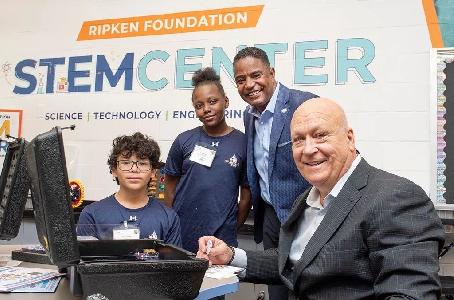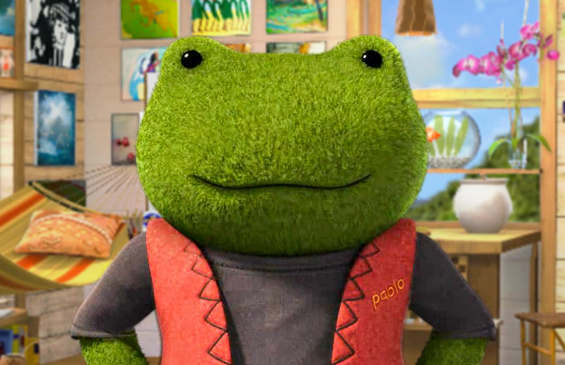Curiosityville, a Cockeysville-based company that wants to foster learning for kids and their families with smarter content and better games, is built on a lot of science.
The premise of this subscription-based online education platform targeting kids between the ages of three and eight is rooted in the contemporary science of learning, sometimes called neuro-education, which links today’s cutting edge brain research to the field of education.
Visit the site here.
 “If you can help a child learn to learn and in fact love learning at a young age, research has shown their trajectories were significantly greater than if you re-mediate at a later stage,” said Susan Magsamen, 53, founder and CEO of Curiosityville with a background in early childhood education.
“If you can help a child learn to learn and in fact love learning at a young age, research has shown their trajectories were significantly greater than if you re-mediate at a later stage,” said Susan Magsamen, 53, founder and CEO of Curiosityville with a background in early childhood education.
Curiosityville, launched publicly last fall but with earlier roots, is very much an organic outgrowth of Magsamen’s longtime career focus on early childhood learning and research into new ways to help children thrive through a mix of family, community and creativity.
The firm, now at five employees, is planning to raise another round of funding, growing its paid customer base and rolling out its mobile strategy, said Magsamen.
The key for Magsamen, who also serves as an advisor to at the Johns Hopkins University School of Medicine’s Brain Science Institute, is her ability to apply her knowledge through entrepreneurship. Before launching Curiosityville, Magsamen had launched and sold in February 1998 a company called Curiosity Kits, a line of educational toys and games.
http://www.youtube.com/watch?v=nZZ8TxtcJuE&feature=youtu.be
Through this experience and her own continued research in early learning, Magsamen developed the concept and pedagogy behind Curiosityville. In a relatively short time, the site and its program has picked up a prestigious set of strategic partners, including National Geographic, Columbia’s Goddard School for Early Childhood Development, Johns Hopkins University and the Association of Children’s Museums.
- Curiosityville gives young children a robust program of learning activities that are fun and developed to help them build important life-long skills, such as executive function, social and emotional stability and 21st century skills, such as collaboration and comfort with technology.
- The platform provides a sophisticated learning management system called The Learning Tree, which gives parents and caregivers a Salesforce-like view on how their children are progressing.
- Magsamen also has built the platform to serve as a virtual community of (and portal for) parents, families and educators through blogs, expert content with tips and best practices all around the topic of early childhood learning, education and growth.
“From the beginning we’ve worked with kids, parents and educators and strategic partners to build Curiosityville,”says Magsamen. “And one of the things we’ve learned is that parents are over-anxious, they’re overwhelmed, they’re exhausted, yet they really want to help provide tools for their children that are going to help them be ready for school and life and to help them get ahead.”
Magsamen says Curiosityville is getting solid early traction both in funding and in customers. After raising $300,000 in 2011 (reported as $415,000 by SEC filings) to prepare a proof of concept for the platform, Magsamen said she then raised $2 million in funding in 2012 to fully build out the site and its overall learning program. In addition, Magsamen says Curiosityville, in its beta stage, already has 2,000 paying customers from the United States and abroad.
“Right now, our average child’s age is about four to five years old, but we really are in that sweet spot of three to seven years, which we really like,” said Magsamen.
Early metrics she shared:
- The average time a child is on the site is three to four times a week
- 37 minutes a session
- They average seven minutes per game.
“We’ve gotten really good at not being a generalist but really being very much a targeted, specific messenger to the children using Curiosityville,” says Magsamen. “And we feel like we’re seeing great retention of our users. And one of the reasons is kids are having fun. And that’s really important. Two, parents are feeling like we’re a resource to help them take the guesswork out of what their child’s doing and provide materials to help their children grow while having fun.”
Curiosityville charges $79 a year, $7.95 a month, for up to four children in a family. Once a child’s birth date is entered, they’re put into a program of games, exploration and learning in key areas, including math, social studies, science, language and literacy, healthy physical development and technology.
Curiosityville, says Magsamen, ultimately aims to help children build skills in these areas gradually and in tune with their own talents.
“Let’s say your three year old is proficient in math – your child will have the ability to scaffold up to a higher age range so we’re not forcing a child to stay at a three year old level when in fact they really have an innate talent in math,” says Magsamen. “We scaffold the children in a very pro-social way to a place where they can find their skill and comfort level and are able to build those skills up through interest to mastery.”
Join the conversation!
Find news, events, jobs and people who share your interests on Technical.ly's open community Slack

Baltimore daily roundup: The city's new esports lab; a conference in Wilmington; GBC reports $4B of economic activity

Baltimore daily roundup: Find your next coworking space; sea turtle legislation; Dali raided and sued

Baltimore daily roundup: Johns Hopkins dedicates The Pava Center; Q1's VC outlook; Cal Ripken inaugurates youth STEM center

